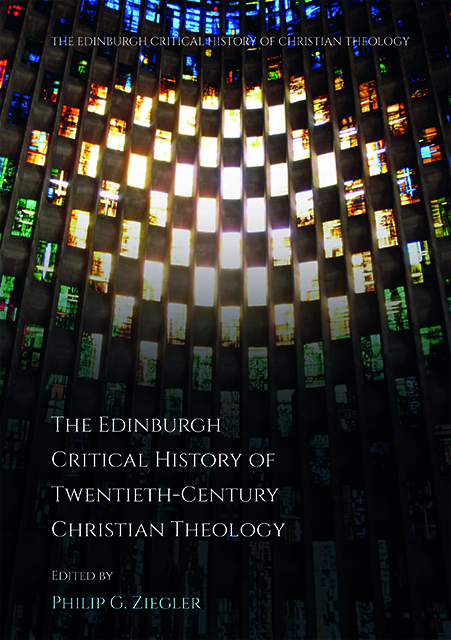Book contents
- Frontmatter
- List of Contents
- Notes on Contributors
- Editor's Introduction
- 1 Modern Theology in a Scientific, Historical Age
- 2 Tradition and Innovation
- 3 Scripture and Criticism
- 4 Reason, Method, System
- 5 Catholicism and Ecumenism
- 6 Fundamentalism and Evangelicalism
- 7 Synagogue, Sho’ah and State
- 8 Religion(s)
- 9 God
- 10 Spirit
- 11 Christ
- 12 Liberation and Freedom
- 13 The Secular – The Political: Augustine and Political Augustinianism in Twentieth-Century Political Theology
- 14 Globalisation after Empires: World Christianity and the Theological De-centring of Europe
- 15 War and Peace
- 16 Race and Black Theology
- 17 Sex and Gender
- 18 Hope
- Index
10 - Spirit
Published online by Cambridge University Press: 14 July 2023
- Frontmatter
- List of Contents
- Notes on Contributors
- Editor's Introduction
- 1 Modern Theology in a Scientific, Historical Age
- 2 Tradition and Innovation
- 3 Scripture and Criticism
- 4 Reason, Method, System
- 5 Catholicism and Ecumenism
- 6 Fundamentalism and Evangelicalism
- 7 Synagogue, Sho’ah and State
- 8 Religion(s)
- 9 God
- 10 Spirit
- 11 Christ
- 12 Liberation and Freedom
- 13 The Secular – The Political: Augustine and Political Augustinianism in Twentieth-Century Political Theology
- 14 Globalisation after Empires: World Christianity and the Theological De-centring of Europe
- 15 War and Peace
- 16 Race and Black Theology
- 17 Sex and Gender
- 18 Hope
- Index
Summary
Introduction: A Pneumatological Renaissance
In recent years, one of the most exciting developments in theology has been an unprecedented interest in the Holy Spirit. The reverberations of this Spirit renaissance can be felt everywhere from new theological studies in the academy to publications of popular books to the emergence of new spiritual orientations and movements such as green or liberation pneumatology. The Roman Catholic Elizabeth Dryer vividly describes this renewed enthusiasm over pneumatology:
Renewed interest in the Holy Spirit is visible in at least three contexts: individual Christians who hunger for a deeper connection with God that is inclusive of all of life as well as the needs of the world; the church that seeks to renew itself through life-giving disciplines and a return to sources; and the formal inquiry of academic philosophy and theology. In effect, one can hear the petition, ‘Come Creator Spirit’ on many lips these days …
While there may be several reasons for the resurgence of pneumatology in our cultural and religious environment in postmodern, pluralistic societies, four somewhat interrelated reasons in theology and spirituality seem to be of decisive importance. First, the entrance of the Eastern Orthodox churches into the official ecumenical organisation, the World Council of Churches (WCC), has made the rich pneumatological and spiritual tradition of this ancient Church family more easily available to other churches. The doctrine of the Spirit has always played a more prominent role in Eastern Orthodox theology, with roots in the classical works of Athanasius, Cyril of Alexandria and the three Cappadocians (Basil the Great, his brother Gregory of Nazianzus and their friend, another Gregory, from Nyssa). The Eastern Church gives a balanced priority to pneumatology, whereas in the Christian West (Roman Catholicism, Anglicanism and Protestantism) the focus is at times placed so much on Christology that the Spirit's role appears to be somewhat marginal. The Eastern Church's cultivated pneumatological sensitivity comes to the fore in doctrine, liturgy and spirituality.
Second, the dramatic spread of the Pentecostal and charismatic movements throughout the world has made other Christians wake up to the significance of the Holy Spirit in the everyday lives of all Christians. The rise of the charismatic movement within virtually every mainstream church has ensured that the Holy Spirit figures prominently on the theological agenda.
- Type
- Chapter
- Information
- Publisher: Edinburgh University PressPrint publication year: 2022



